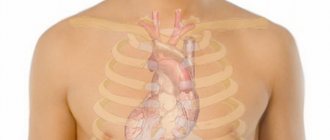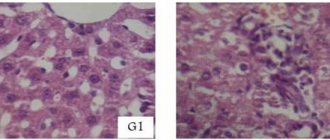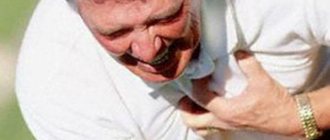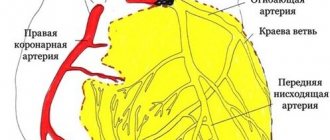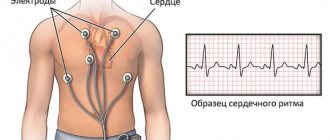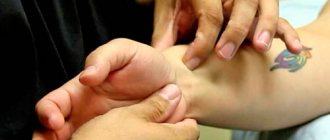Most people are accustomed to the fact that a cough is a companion to a cold or allergy. Could a cough be caused by the heart? Yes, because with cardiac pathologies, the synchronous functioning of the ventricles of the heart may be disrupted. The right one actively fills the lung tissue with blood, while the left one pumps it out more slowly. This provokes poor blood circulation and increased pressure in the lungs, which causes hypoxia. The patient constantly wants to cough and inhale more air, and most often the cough is dry. In such cases they talk about cardiac cough.
Causes of cardiac cough
One of the common symptoms of heart pathologies associated with lung function is shortness of breath. It can be felt already in the early stages of the disease. You can often notice that people with shortness of breath during physical or emotional stress begin to cough. This is the so-called “cough from the heart.”
This type of cough owes its origin to functional disorders of the heart muscle. Coughing in heart disease is a fairly common occurrence, because the heart muscle and its main vessels are closely connected to the lungs and bronchi.
Disturbances in blood flow in the pulmonary circulation can manifest themselves to varying degrees: at an early stage they can cause a slight cough, and in an advanced state – pulmonary edema. This is the most severe manifestation of heart failure and is associated with cough. In this case, the patient requires urgent medical attention. Now you have a unique opportunity to undergo a free consultation with a specialist and a set of preparatory examinations when enrolling in a course of enhanced external counterpulsation or shock wave therapy of the heart:
Promotion
Just until the end of autumn, undergo a free consultation and a set of preparatory examinations* when registering for a course of enhanced external counterpulsation or shock wave therapy of the heart.**
Send a request
* Check the details of the Promotion by phone. **Has contraindications; consultation with a doctor is required.
Enhanced external counterpulsation (EECP) Cardiac shock wave therapy (SWTS)
Hurry up to apply, the promotion period is limited.
Drug treatment of tracheitis
The drug treatment regimen for acute tracheitis is drawn up taking into account the nature of the disease and the severity of the patient’s symptoms.
Impact on the cause
If the causative agent is a particular virus, antiviral agents are usually used, as well as immunostimulants (for example, preparations based on echinacea). For severe and protracted tracheitis of a bacterial nature, the doctor may introduce antibiotics into the treatment regimen. If the disease proceeds without complications, it is usually possible to cope with it without these remedies. But the decision on the rationality and duration of antibiotic therapy should be made only by a doctor. In some cases, with tracheitis, a bacteriological examination of sputum is carried out before starting treatment with antimicrobial agents. It is sown on nutrient media to determine the type of pathogen and its sensitivity to the main groups of drugs. This will help you choose the most suitable antibiotic.
Treating coughs and clearing the airways
When treating acute tracheitis, great attention should be paid, of course, to cough, the main symptom of the disease. For a dry, debilitating, nonproductive cough, medications that suppress the cough reflex are used. This measure may be necessary in the first days of tracheitis. At the next stage of the disease, the main goal of treatment is to clear the airways of the mucus that forms. To do this, it is necessary to facilitate its passage with the help of mucolytic and expectorant agents. But they cannot be used simultaneously with antitussive drugs. It is also unacceptable to suppress a wet cough. This is fraught with stagnation of sputum and the transition of inflammation to the underlying parts of the respiratory system, up to the development of bronchopneumonia.
Maintenance therapy
Herbal remedies may be helpful to relieve the symptoms of tracheitis. For tracheitis, they can be used in the form of decoctions and infusions. But a more convenient and reliable method of treatment is the use of ready-made herbal products with a carefully selected and balanced composition. For example, in a complex treatment regimen for tracheitis, you can include Doctor MOM® cough syrup, which contains extracts of licorice, elecampane, Vasiki adatodes, Indian nightshade and other medicinal plants - 10 medicinal plants in total. It is suitable for both adults and children over 3 years old. This remedy helps thin mucus and helps remove it from the respiratory tract, and also relieves inflammation. For adults, there are also herbal cough lozenges Doctor MOM® based on extracts of licorice, ginger and Emblica officinalis. They also soften coughs and have anti-inflammatory and expectorant effects. Such lozenges can be used as an aid in the treatment of tracheitis. They help cope with coughing attacks and ease the course of the disease.
How does cough occur in heart disease?
Weak functioning of the left ventricle and the pathological processes occurring in it are the main cause of cardiac cough. In this case we talk about left ventricular failure. It leads to deterioration of blood circulation in the pulmonary arteries, sclerosis of small vessels, and increased pressure in the lungs. Their tissues do not have enough oxygen - this is why the patient experiences shortness of breath and suffocates. In turn, problems in the pulmonary circulation aggravate the condition of the heart muscle.
One of the symptoms of cough in heart failure is hemoptysis. This phenomenon also has its own reason: since the volume of blood in the lungs exceeds the normal level, its excess accumulates and comes out of the bronchi when coughing. After all, a cough is a natural reaction of the body when the lungs, bronchi, and alveoli become overfilled with fluid or a foreign body enters them.
A cardiac cough almost always manifests itself at moments when the patient is exposed to physical exertion. However, if the cardiac dysfunction is quite severe, the patient only needs to take a lying position to start choking from coughing. In this case, excess fluid begins to intensively fill the lungs, causing irritation and continuous coughing.
Treatment of acute tracheitis
Acute tracheitis must be treated under the supervision of a specialist. In some cases, additional examination is required to clarify the cause and nature of the disease.
The main objectives are:
- impact on the cause of the disease. This includes stopping an allergic reaction, eliminating an infection, removing a foreign body, avoiding the action of provoking factors;
- relief of coughing, transformation of a dry cough into a wet one;
- reducing the severity of inflammation;
- elimination of background and aggravating conditions of tracheitis: lack of vitamins, exhaustion, weakened immunity;
- reducing the severity of intoxication and (if necessary) lowering body temperature. It is important to remember that fever is a natural mechanism to fight infection. Therefore, you should not abuse antipyretics. They can improve your well-being, but do not affect the course of the disease.
Uncomplicated forms of tracheitis can be treated on an outpatient basis. But severe cases of the disease may require hospitalization. Particular attention is paid to the treatment of weakened and elderly patients, especially if they are unable to move independently for health reasons, because tracheitis in them quite easily turns into tracheobronchitis and even pneumonia. Treatment is carried out comprehensively, using medications and non-drug methods. You should not interrupt therapy after the condition improves; you must follow the time limits for taking medications recommended by your doctor.
Cough due to heart failure
Heart failure is an extremely common disease associated with blood stagnation due to impaired circulation in large vessels. In most patients, this pathology is accompanied by shortness of breath and cough, which has the origin described above.
The nature of the cough can be different:
- paroxysmal and dry;
- exhausting and loud;
- irritating dry;
- sharp and short.
A cardiac cough can be a persistent problem for people with chronic heart failure . It occurs during times of physical or emotional stress and is usually characterized as dry and jerky.
In acute heart failure, a cough may begin with shortness of breath at night, which turns into suffocation due to the overfilling of the lungs with fluid. When breathing, the lungs begin to make bubbling sounds. The patient may cough producing bloody, frothy sputum due to a rapid increase in sputum volume in the lungs.
When to ask for help
Naturally, in the acute phase you need to seek help immediately. In other situations, if some atypical health problems begin that are embarrassing, you should not try to treat yourself. It is necessary to consult a doctor - a therapist or cardiologist. Moreover, you should not practice folk remedies - you can simply waste time. Those who have people in their family suffering from heart disease should be especially attentive to themselves. After all, hereditary risks in the development of cardiovascular pathologies are quite high.
Symptoms of cardiac cough
Most often, patients in the early stages of developing heart pathologies are alarmed by a dry cough that lasts a long time and is not associated with colds. Pain in the heart when coughing is a clear sign of problems in the functioning of this organ and a signal about the need to start treatment.
Subsequently, coughing attacks begin to overcome the patient even with minimal physical exertion and at night, often accompanied by the release of foamy sputum with traces of blood. This is why many heart patients sleep sitting up.
Other common symptoms include:
- increased heart rate;
- weakness and loss of consciousness;
- lack of air;
- swelling of the veins in the neck;
- bubbling in the lungs audible from a distance.
As already mentioned, a cardiac cough is almost always accompanied by shortness of breath. Unlike bronchitis, a cardiac cough rarely produces sputum. It also differs from a smoker's cough, which has a barking character.
Soothing collection of medicinal herbs: lemon balm, yarrow, valerian
All components are thoroughly crushed and combined in one container. As needed, the decoction is prepared as follows: 1 tbsp. l. pour 0.5 liters of water at room temperature into the mixture and leave for 4 hours. Then the container is placed on the fire, the liquid is boiled, and filtered. Take a sip during the day, daily dose - 1 glass, course - 1 month.
- Pumpkin pulp to eliminate swelling or prevent it.
Grind 500 g of the fruit and eat it raw or drink the squeezed juice. Regular consumption of pumpkin is indicated for elderly patients with heart pathologies.
- Lemon garlic syrup.
Pass 5 heads of the spicy vegetable plant through a press, squeeze 5 citrus fruits into the resulting pulp, add 500 g of honey, seal, and put in the pantry for 10 days. Use 1 tsp. before meals 4 times a day.
Case from practice
Patient M.M. (female, age 1 year and 1 month) was taken to the pediatric hospital.
Diagnosis upon admission: prolonged pneumonia, subacute form of carditis.
The illness began with a low-grade fever and a rare dry cough, which became more frequent and intrusive as it worsened. The parents decided to seek medical help after the child’s condition sharply deteriorated: his breathing became groaning, shortness of breath appeared, the cough became wet, and appeared in the form of prolonged painful attacks. At the same time, cyanotic skin, a sharp decrease in the daily volume of urine and a restless state of the child were noted.
Before admission to this department, the patient had already been treated for pneumonia in three other hospitals. Everywhere she was prescribed various antibiotics:
- semisynthetic penicillins;
- cephalosporins of various generations;
- aminoglycosides.
The treatment never brought any expected effect, except, perhaps, for a short-term, insignificant reduction in the symptoms of both pathologies.
A child was admitted to pediatrics in a very serious condition, with a temperature of 39.4°C. The patient is restless, constantly moans, and is in a forced position - half-sitting. The skin is earthy gray and has a marbled tint. The fingers and nasolabial triangle are cyanotic, the face has a cyanotic blush.
There are painful coughing attacks against a background of severe shortness of breath with a respiratory rate of up to 75 per minute, while auxiliary muscles are involved.
Auscultation of the lungs reveals fine- and medium-bubbling rales on both sides.
There is an expansion of the cardiac boundaries. During auscultation of the heart, dull tones are heard, as well as a rough murmur in systole (Botkin's point, apex). Severe tachycardia is observed - up to 170 contractions per minute.
A cardiogram was taken. On the film: sinus tachycardia, both ventricles are hypertrophied, both atria are overloaded, the electrical axis is deviated to the right.
An echocardiography was also performed, which showed that both ventricles were dilated and the contractility of the heart muscle was greatly reduced.
A chest x-ray showed thymomegaly, cardiomegaly, the presence of infiltrates in both lungs, and increased bronchial and vascular patterns.
Finally, a mycological study of blood and throat swabs was carried out!
As one would expect, a huge number of fungi were found. Representatives of the genus Paecilomyce belonging to the species viridis were sown.
Based on the examinations, the following clinical diagnosis was established: subacute sepsis of fungal etiology with septicemia at its height. Subacute non-rheumatic fungal carditis in severe form. Total cardiac failure.
Stepwise therapy of pecilomycosis sepsis with Diflucan was carried out. Carditis and heart failure were also treated, and immunity deficiency was corrected. Vitamin therapy was prescribed.
After the treatment, a significant improvement in the child’s condition was observed:
- normalization of respiratory rate and heart rate;
- the beginning of resorption of infiltrates in the lungs;
- reduction of Paecilomyces fungi;
- improvement of myocardial contractility;
- reduction in the severity of cyanosis;
- normalization of body temperature.
After 17 days, the patient was discharged from the inpatient department and transferred under the dispensary observation of a pediatric cardiologist and local pediatrician.
Doctor's advice: what examinations to undergo and who to consult
If you suspect that the cough that bothers you from time to time is not due to a cold or more significant diseases of the bronchopulmonary system, but to the heart, I would recommend first contacting a general practitioner or family doctor.
These specialists will prescribe all the necessary initial tests and immediately begin treatment if the cough is not of cardiac origin. And if the suspicions are confirmed, then the patient, having come to the cardiologist with the results of all primary tests, will be immediately referred for more specific examinations.
Here is a list of examinations required for patients with suspected cardiac cough:
- ECG;
- Ultrasound of the heart;
- coronary angiography;
- general blood analysis;
- transesophageal echocardiography;
- X-ray examination of the lungs;
- thyroid hormone panel;
- blood test for serum creatinine.
You will also need to have your urine tested if you have hypertension. After examining it, the doctor will conclude whether it is caused by kidney disease.

